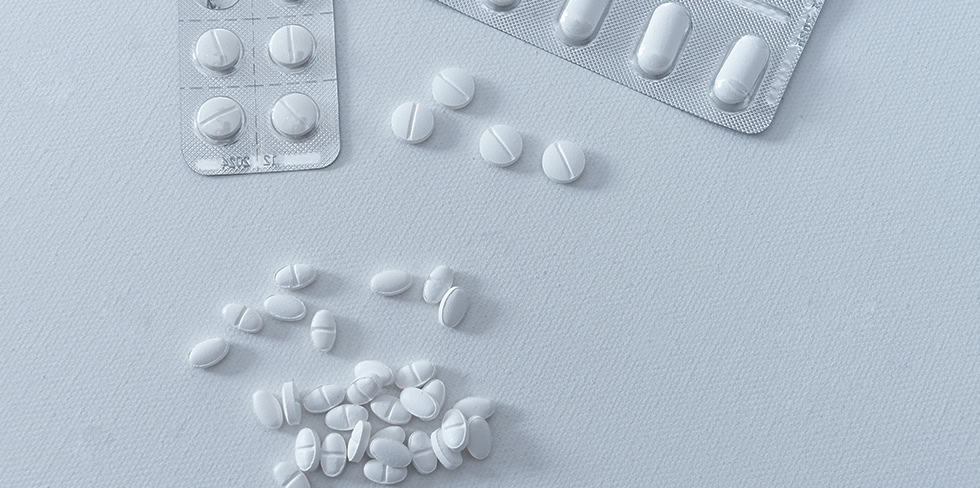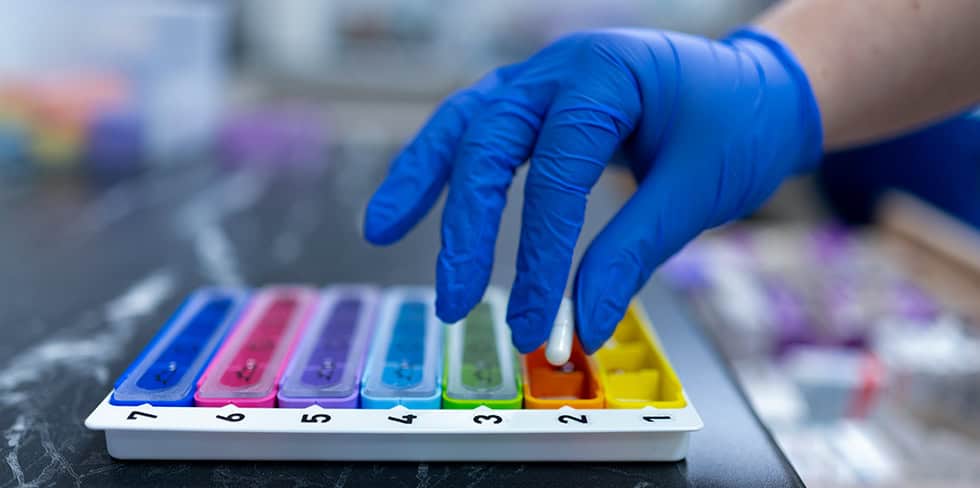Possibility of cost reimbursement through health insurance
Benzodiazepines are drugs used to treat anxiety, insomnia, epilepsy, and muscle tension. They belong to the group of psychoactive substances that act as central nervous system depressants, reducing tension and causing sedation.
Although they are useful in the short-term treatment of certain conditions, long-term use of benzodiazepines can lead to the development of addiction. Over time, the body develops tolerance, meaning that increasing doses are required to achieve the same effect. Abrupt discontinuation may cause withdrawal syndrome, which includes physical and psychological symptoms such as anxiety, insomnia, tremors, and rapid heartbeat.
Benzodiazepine addiction is a complex issue that requires a serious approach and careful planning of the weaning process. The following will explain how benzodiazepines work, why they cause addiction, and what the symptoms of withdrawal are.
Benzodiazepines are a group of drugs used to reduce anxiety, treat insomnia, epileptic seizures, and muscle tension. They work by enhancing the action of the neurotransmitter GABA (gamma-aminobutyric acid), which calms the nervous system. In this way, they reduce feelings of anxiety, relax the muscles, and help with sleep problems.
This group of drugs is classified as anxiolytics, sedatives, and hypnotics, and depending on the type and doses, they may act quickly or slowly, with different durations of effect.

Benzodiazepines are used in medicine to treat various conditions, primarily anxiety, insomnia, and epileptic seizures. They are also prescribed to patients suffering from muscle spasms, panic disorders, or post-traumatic stress. Their quick and effective action makes them one of the most commonly used anxiolytics.
However, it is precisely this speed of action that often leads to abuse. People who face stress or insomnia sometimes take them on their own, without consulting a doctor. Initially, they act as an effective solution, but long-term use can cause addiction. Over time, the body develops tolerance, meaning that higher and higher doses are needed to achieve the same effect.
Benzodiazepine abuse often occurs in people with a previous history of problems with addiction to substances such as alcohol or other psychoactive drugs. It can also occur in those who originally used the drugs for therapeutic purposes but continued to take them beyond the recommended period.
One of the key problems is that people who use benzodiazepines often do not recognise when they cross the line between medical use and addiction. In addition to the physical need for the drug, there is also psychological dependence – the person feels they cannot function normally without taking the dose.
Dependence on benzodiazepines develops gradually, and symptoms may be subtle at first. A person initially feels the need to take them more often than recommended, and then increases the dose to achieve the same effect. Over time, physical, psychological, and behavioural symptoms appear, indicating that the body has become dependent.
Psychological dependence manifests itself through a feeling of insecurity and anxiety when a person does not take their usual dose. Increased irritability, panic attacks, and depressive episodes are also common. Over time, a person may become emotionally unstable, with sudden mood changes, and in some cases, paranoid thoughts may occur.
People who become addicted to benzodiazepines often change their daily routines and habits. They withdraw from social activities, lose interest in work or school, and start spending more and more time thinking about the next dose. Some may resort to seeking multiple prescriptions from different doctors or buying drugs illegally.
These symptoms are a clear sign that the addiction has already developed and that steps towards treatment need to be taken.
A withdrawal crisis occurs when a person who has developed an addiction suddenly stops using benzodiazepines or significantly reduces the dose. This process can cause a number of unpleasant and serious symptoms, and the intensity depends on the length of use, the type of drug, the dose that was taken, and the individual characteristics of the patient.
People who have used benzodiazepines for more than a few months, even in therapeutic doses, may develop withdrawal symptoms if use is stopped abruptly. For those who have used high doses or abused the drugs, withdrawal symptoms can be severe, intense, and potentially life-threatening.
Benzodiazepines affect the central nervous system by enhancing the action of the neurotransmitter GABA (gamma-aminobutyric acid), which has a calming effect on the brain and body. GABA reduces excessive brain activity, leading to relaxation, a reduction in anxiety, and the induction of sleep.
Long-term use of benzodiazepines causes the brain to reduce its own production of the GABA neurotransmitter, as it becomes reliant on the drug to achieve a calming effect. When the medication is suddenly stopped, the brain remains in a state of hyperactivity, as there are not enough natural mechanisms to regulate excitement and stress. This leads to a wide range of withdrawal symptoms, including insomnia, anxiety, tremors, rapid heartbeat, and, in severe cases, epileptic seizures.
Withdrawal from benzodiazepines can cause a variety of physical symptoms, which can vary in intensity and duration. The most common physical symptoms include:
Therefore, it is necessary that the weaning process be carefully managed to minimise symptoms and help the patient tolerate the detoxification process more easily.
Withdrawal from benzodiazepines can be extremely difficult and unpleasant, and in some cases, even life-threatening. As such, abrupt discontinuation of these medications is not recommended without professional supervision. A properly managed gradual dose reduction, with medical support, enables a safer and more successful recovery.
Anyone who recognises signs of addiction or experiences withdrawal symptoms should seek professional help to navigate the detox process safely and avoid the serious consequences of abrupt discontinuation of benzodiazepines.
Due to the severity of symptoms, abrupt discontinuation of benzodiazepines is not recommended, as it may be hazardous to health.
Treatment for benzodiazepine addiction requires a carefully planned process that includes gradual dose reduction, medical supervision, and support for the physical and psychological stabilisation of the patient’s condition. Dependence on these drugs cannot be resolved by suddenly stopping the therapy, as this could lead to severe withdrawal symptoms, including insomnia, anxiety, tremors, rapid heart rate, and in the most severe cases, epileptic seizures and serious cardiovascular complications.
To achieve a safe and successful recovery, treatment is carried out through several stages, each of which has its own goal and importance in the weaning process.
The process of treating benzodiazepine addiction includes several stages, each tailored to the individual needs of the patient.
The first and most important step in the treatment of benzodiazepine addiction is to gradually reduce the dose of the medication. Abrupt cessation of use can cause severe withdrawal symptoms and endanger the patient’s health. To avoid this, a customised dose reduction plan is used, allowing the brain to gradually adapt to the reduced presence of benzodiazepines in the body.
Although physical withdrawal is a key part of the process, benzodiazepine addiction is not only a physical issue, but also a psychological one. Many patients initially began using these drugs due to anxiety, stress, or sleep problems. Therefore, after detoxification, feelings of insecurity may persist, along with increased sensitivity to stressful situations.
Psychological support helps patients understand the causes of their addiction and develop new coping mechanisms for managing stress. At this stage, patients can learn how to regulate anxiety without the use of medication, how to improve the quality of sleep, and how to establish healthier lifestyle habits.
For patients undergoing primary medical treatment for 14 to 21 days, psychological support in the initial stages mainly focuses on mood stabilisation and the reduction of acute withdrawal symptoms. Longer-term psychotherapy may continue after the completion of basic treatment, depending on the patient’s needs.
Treatment for benzodiazepine addiction is not a simple process, but with the right approach and support from specialists, a full recovery is possible.
People who recognise the problem of addiction should seek professional help as soon as possible to prevent further abuse and health complications. Timely initiation of treatment increases the chances of a successful recovery and a return to a normal life free from addiction.
The duration of treatment depends on the degree of addiction, but in most cases, medical treatment lasts from 14 to 21 days. This period is crucial as it allows the body to gradually be freed from benzodiazepines, while the symptoms of withdrawal are alleviated under professional supervision.
Treatment begins with the controlled tapering of the benzodiazepine dose. Abrupt cessation is not recommended, as it can cause severe withdrawal symptoms, including anxiety, insomnia, tremors, and rapid heart rate.
The patient undergoes an individually tailored detoxification plan, where the dose is gradually reduced depending on previous use. During this period, non-benzodiazepine medications are introduced into the therapy to help control symptoms.
By the end of this period, the patient is physically stabilised and ready to continue their recovery in a day-to-day environment. Although the body is no longer physically dependent, mild residual symptoms—such as insomnia or occasional anxiety—may persist, gradually subsiding over the following weeks.
Upon discharge, the patient receives recommendations for ongoing care, including guidance on maintaining stability, avoiding triggers, and adopting lifestyle changes that previously contributed to the development of dependency.
This 14 to 21-day period is crucial for breaking the cycle of addiction and lays the foundation for continued recovery.
Although the body is freed from physical dependence within 14 to 21 days, long-term use of benzodiazepines can lead to lasting effects that do not resolve immediately after detoxification. These effects may persist for weeks or even months after stopping the medication, which is why it is essential to understand their impact and how they can be managed.
People who have taken benzodiazepines over an extended period often report difficulties with concentration, memory issues, and emotional instability. In addition, mood changes, increased sensitivity to stress, and occasional episodes of anxiety may also occur.
Prolonged addiction can also lead to physical consequences, such as sleep disturbances, reduced energy levels, and occasional dizziness. These symptoms result from the long-term suppression of the central nervous system and generally diminish gradually as the brain begins to restore its normal functioning.
Support from family and loved ones plays a crucial role in maintaining stability after treatment. Individuals who have experienced addiction should avoid stressful environments and triggers that previously led to benzodiazepine misuse.
Although recovery is a longer process than medical treatment itself, with the right support and effective strategies, it is entirely possible to overcome addiction and regain control over one’s life.

The treatment of benzodiazepine addiction is a personalised process that requires professional supervision and the adjustment of therapy to suit the patient’s individual condition. For this reason, the cost of treatment can vary depending on the duration, medical methods used, and the specific needs of each patient.
The first step towards treatment is to schedule a consultation with our professional team. During the initial assessment, we evaluate the level of dependence, the patient’s overall health, and determine the most appropriate course of therapy. Based on this evaluation, an individualised treatment plan is created.
The cost of treatment depends on several factors, including the length of stay in the medical facility, the therapies applied, and the need for additional medication. In addition to standard detoxification procedures, it is also possible to include supplementary methods to further support the patient’s stabilisation.
For detailed information on treatment costs and available payment options, patients are encouraged to contact our medical team. We will provide accurate information and help tailor the treatment plan to suit each individual’s needs and financial circumstances.
Once treatment has been scheduled, the patient undergoes an admission process and a personalised medical assessment. During this stage, a detoxification plan is created, therapeutic steps are outlined, and the patient is provided with all the necessary information regarding the upcoming phases of treatment.
It is important to emphasise that early intervention plays a crucial role in successful recovery. The sooner the problem is recognised and appropriate action is taken, the greater the chances of achieving full recovery and long-term stabilisation.